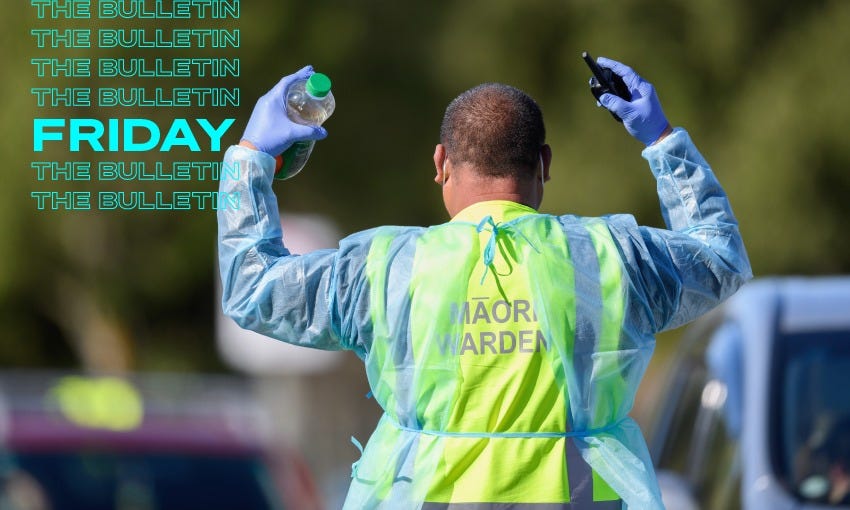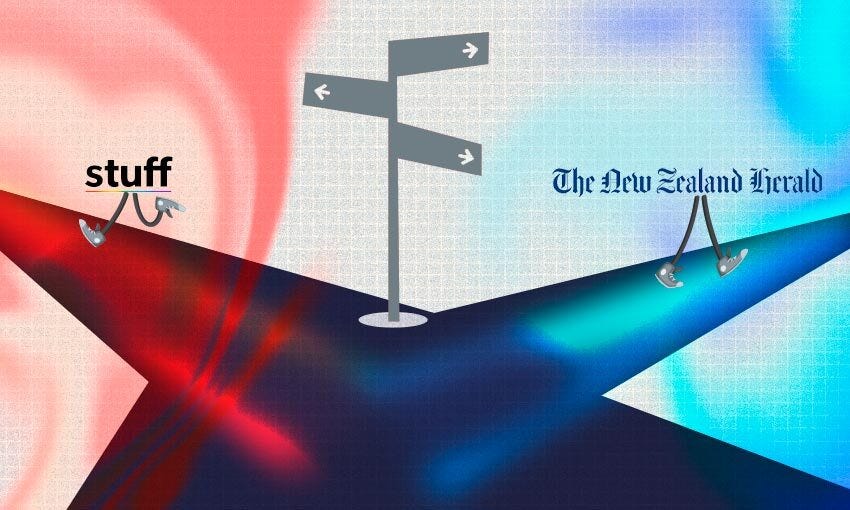The race to boost Māori vaccination rates
Leaders are warning of possible devastation in their communities as Māori vaccination rates remain far below the national average with cases projected to keep growing
Mōrena and welcome to The Bulletin for Friday, November 19, by Justin Giovannetti. Presented in partnership with Z Energy.
In today’s edition: Groundswell protests this weekend; bargain interest rates are over; vaccine pass website still troubled; but first, a last push for vaccination rates.
A guard at a Covid-19 testing centre in Christchurch. (Kai Schwoerer/Getty Images)
There’s less than a month before Aucklanders can travel. Māori leaders are warning that the government’s decision to open Auckland’s border for the summer could be devastating for their communities. As te ao Māori News reports, there could be 6,600 Māori cases by Christmas, according to projections of where the outbreak is headed. More than 42% of current cases are Māori, a percentage that is growing faster than the outbreak. Many areas with the lowest vaccination rates have large Māori populations, including the East Coast and Northland. Former MP Shane Jones told Stuff that Northland will never hit 90% and called on the border to reopen, while local iwi leaders have said they need more time to plan for December’s reopening on the motorways heading north from Auckland.
The battle has moved to parliament. Reflecting the growing conflict between the Labour government and Māori groups, Te Pāti Māori and the government are now at loggerheads. The opposition party is warning of a looming “bureaucratic genocide” created by failures in Wellington and a prime minister who, according to the party’s co-leaders, now fully understands what she’s about to do to Māori. Politik has looked at the party’s sustained attacks on the government this week. The Beehive has responded by rejecting the party’s call to keep Auckland isolated until vaccination rates hit 95%.
A last-minute splurge on advertising. The government has put forward $50 million to boost Māori vaccination rates. Across the motu, 91% of the eligible population has had one dose and 82% are fully vaccinated. The rates for Māori are far lower, at 78% and 62% respectively. Of the four main ethnic groups tracked by the Ministry of Health, the Māori community’s rates are the lowest by far. That’s partly a reflection of the group’s younger population, meaning it was last in line for doses. However, as the NZ Herald reports, the government has now handed out 26 contracts to boost vaccination rates before the Auckland border opens on December 15. Newly-funded initiatives include TikTok campaigns, kapa haka and much door-knocking — as well as a heavy advertising blitz, judging from the number of ads on YouTube and Spotify.
Covid will spread to every corner of the North Island. In the NZ Herald, the health minister has warned that 16,000 cases a week is the worst-case scenario in this delta outbreak. Writing in Newsroom, Marc Daalder has looked at what could be Covid’s unstoppable summer. Outside of Auckland, most New Zealanders still aren’t used to the idea of Covid-19 in their communities. Here’s a powerful paragraph from Daalder’s piece that stood out:
“Health experts say Covid-19 will soon spread to every corner of the North Island and could spark massive outbreaks in Māori communities. While those living in the hyper-vaccinated urban strongholds may not experience too much disruption, the virus will go wild wherever vaccination rates are low. Children too could suffer, with an immunologist warning that most kids under the age of 12 are likely to contract Covid-19 in the coming months”.
A message from The Spinoff’s new editor Madeleine Chapman:
Like any good door-to-door salesperson, I’m about to cheerily introduce myself and then, in the very next breath, ask you for money. Hi! I’m Madeleine (or Mad) Chapman, previously an intern at The Spinoff, then a staff writer, senior writer and now editor. It certainly wasn’t the plan to step into this role in the middle of a delta outbreak, nor did I think my first weeks on the job would unfold alongside New Zealand’s largest city slowly coming out of stagnation. But despite the strange and unfortunate circumstances, The Spinoff team has stepped up once again, working tirelessly (and mostly from our bedrooms) to bring you the most important news when you need it, and the lighter moments when things are looking a little bleak. We’ve been able to continue this work because of the ongoing contributions from our members and I can’t thank you enough.
But can I boldly ask that you consider becoming a member if you aren’t one already? If you’ve read something on our site recently that you enjoyed or appreciated, consider it a koha for that alone, because every dollar donated through The Spinoff Members is used to create more of the work you see every day. With Christmas around the corner (which I’m finding genuinely hard to believe), there’s no such thing as shipping delays on a membership of The Spinoff bought for whānau and friends.
Some Groundswell organisers cancel planned protests because of ‘fringe elements’. More than 70 of the farming protests are scheduled over the weekend, but the Dominion Post reports that organisers in Masterton have cancelled their event because of the threat of anti-vaxxers. While Groundswell has an expansive agenda, a number of farmers have expressed concerns that the agricultural event has been hijacked. According to the Southland Times, Act and Groundswell’s leader are now asking for an apology after a government minister labelled the event “a mixture of racism and anti-vax”.
The Covid numbers: Two deaths were reported yesterday. There are 85 cases in hospital and 6 in ICU/HDU. There are now 4,172 active cases in New Zealand. 142 new community cases were reported in Auckland yesterday, 17 in Waikato, 5 in Northland, 1 in Bay of Plenty, 1 in Lakes DHB and 1 in Canterbury. 20,408 people were vaccinated on Wednesday.
The Spinoff’s Covid data tracker has the latest figures.
Bargain interest rates are over, hundreds of thousands abandon house dreams. Fixed mortgage interest rates are up in anticipation of future hikes in the cost of borrowing by the reserve bank, meaning it isn’t possible to dodge next year’s rate increases anymore, Stuff reports. The average one-year rate was 3.82% last month and rising. Coupled with a surge in house prices, nearly 300,000 New Zealanders have given up on plans to buy a house, according to BusinessDesk. Polling shows 27% of non-homeowners don’t want to buy property anymore, more than double the rate over the past three years. After years of frugal living and saving, a number of young people have just given up as prices soar.
Government’s My Covid Record still crashing on second day. The Covid-19 minister said the vaccine pass website was designed to handle the entire country’s population every few hours, but the government has now blamed overeager cyber defences for ongoing errors, according to the NZ Herald. I asked Ben Gracewood, The Spinoff’s chief technology officer, to explain what’s going on:
It’s hard to know precisely what is going wrong, but all signs point to an overloaded system built on a rushed deadline. What we’re seeing seems to be the system letting a few people through at a time, while throwing errors for others. This whole thing is quite literally a waking nightmare for most people who work in IT: deploying a system on a deadline with the whole country watching. Some sort of failure was pretty much guaranteed. The real test will be if the system can remain stable under the constant low-level load we’ll expect over the coming months.
You should be able to build a system to handle four million vaccinated kiwis logging in at once, but doing it in four weeks on a reasonable budget is a huge ask.
A small Otago town was first to spot a growing international dispute. In the first of two space stories today, the Otago Daily Times reports that a space radar in Naseby was the first to detect a Russian missile test on Monday that has caused international tensions to rise. The missile obliterated a satellite and the debris field it created, which now threatens the International Space Station, was first detected in Otago. The Naseby site specialises in tracking debris in low orbit, which is now more important than ever.
Look to the sky tonight for the blood micromoon. New Zealanders will experience the longest near-total lunar eclipse in 800 years, according to The Guardian. Starting around 8:20pm, it’ll last until midnight. However, you’ll want to look outside at around 10pm, when most of the moon is covered by the Earth’s shadow and the lunar surface turns red. As astronomical sights go this one is pretty early, so even the kids can enjoy it.
Got some feedback about The Bulletin, or anything in the news?
Get in touch with me at thebulletin@thespinoff.co.nz
(Tina Tiller)
Right now on The Spinoff: Hal Crawford explores why New Zealand’s centrist media is diverging, with Stuff headed left while NZME tacks to the right. Justin Latif reports on how South Auckland councillors have greeted the government’s new zoning rules. Leonie Hayden considers how to ask those tricky Covid questions this summer, such as: “Poo your breath stinks, can you put on a mask?” Fergus Barrowman looks at a new anthology of the literary magazine Sport.
Series of changes made to All Blacks before final test of the year. Following a loss in Dublin last week, coach Ian Foster has shaken-up his side, Stuff reports. Aaron Smith and Richie Mo’unga are in, while TJ Perenara and Beauden Barrett (possible head injury) are out. The goal is to “inject some energy” into a team that was thoroughly outplayed by Ireland. Their French opponents will have spent the week looking closely at what happened in Dublin and how they might be able to capitalise on errors when the All Blacks take the field in Paris.
That's it for The Bulletin. If you want to support the work we do at The Spinoff, please check out our membership programme.







